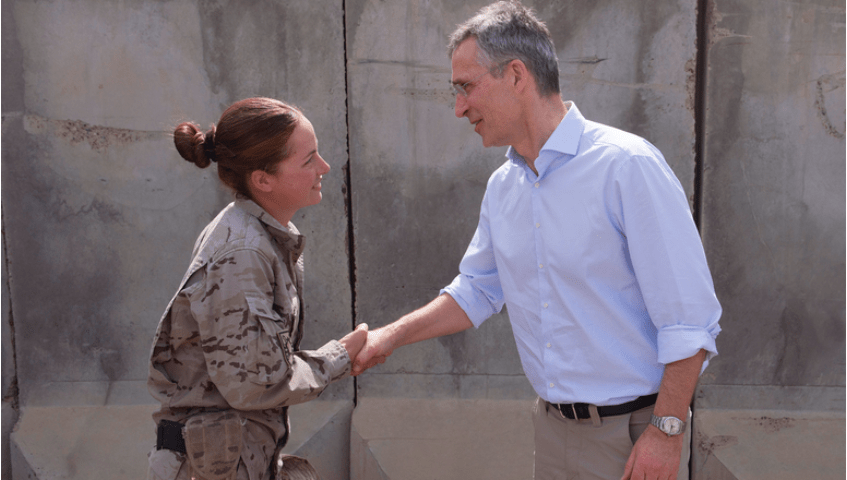
Introduction
The Beijing Platform for Action is a landmark document that emanated from the Fourth World Conference on Women, convened in Beijing, China in September 1995. United Nations (UN) member states and civil society participants from around the world reviewed progress and outlined new requirements to accelerate gender equality and the empowerment of women.
The Platform for Action reaffirms the fundamental principle that the human rights of women and girls are an inalienable, integral and indivisible part of universal human rights. As an agenda for action, the Platform seeks to promote and protect the full enjoyment of all human rights and the fundamental freedoms of all women. One of the areas of importance for NATO has been the attention to women and armed conflict, foundation of which was laid by the UN Security Council Resolution (UNSCR) 1325 in 2000. It was this resolution that first prompted the joint adaptation by the NATO and the Euro-Atlantic Partnership Council (EAPC) of the Policy and Action Plan on Women, Peace and Security in 2007.
The year 2020 will mark 20 years since the adoption of the UNSCR 1325. Though a lot has been done, much more work remains. Sustainable peace cannot be achieved without women’s security and equality. Correlation between inclusion of women and peaceful resolution of conflicts has been shown many times whilst at the same time women still remain excluded from peace-making and other decision-making processes. Gender is still not fully considered across majority of national defence and security sectors, and women and children continue to suffer disproportionately as a result of conflict-related sexual abuse.
Role of NATO
The NATO’s first policy on the implementation of UNSCR 1325 was the adaptation of the above mentioned Policy and Action Plan on Women, Peace and Security in 2007. Then in 2010, an Action Plan was adopted and subsequently revised at the NATO Wales Summit in 2014. The NATO Heads of State and Government acknowledged in Wales Summit that the integration of “gender perspectives into Alliance activities throughout NATO’s three core tasks (i.e., Collective Defence, Crisis Management, and Cooperative Security) will contribute to a more modern, ready and responsive NATO” (Para. 90, Wales Summit Declaration, 2014).
In 2012, the then NATO Secretary General Anders Fogh Rasmussen appointed the first NATO Special Representative for Women, Peace and Security, based with NATO’s International Secretariat in Brussels. Later, in 2018, the NATO Heads of State and Government further reinforced their commitment in endorsing a new policy and Action Plan on Women, Peace and Security (WPS) at the Brussels Summit. The new policy builds on a framework of three guiding principles: Integration, Inclusiveness and Integrity. Accordingly;
- Gender equality must be considered as an integral part of NATO policies, programs and projects guided by effective gender mainstreaming practices. To achieve gender equality, it must be acknowledged that each policy, program, and project affects both women and men (Integration).
- Representation of women across NATO and in national forces is necessary to enhance operational effectiveness and success. NATO will seek to increase the participation of women in all tasks throughout the International Military Staff and International Staff at all levels(Inclusiveness).
- Systemic inequalities are addressed to ensure fair and equal treatment of women and men Alliance-wide. Accountability on all efforts to increase awareness and implementation of the WPS agenda will be made a priority in accordance with international frameworks (Integrity).
Working with Partners
In addition to its member states, NATO has a wide-reaching partnership program with 40 countries around the world and a large number of international organizations such as the European Union, the United Nations, Organization of the Security and Cooperation in Europe, the African Union and others. NATO regularly participates at international forums devoted to women’s rights, women and security, gender mainstreaming and others. For instance, the Secretary General’s Special Representative has spoken to the UN Security Council on conflict-related sexual violence and NATO’s progress on the WPS agenda, engaged with Ukraine’s Parliamentary Congress on the importance of incorporating gender perspectives across various aspects of the defence and security sectors, and has worked with officials in Bosnia on the role of youth in advancing WPS.
Through a number of cooperation programs and tools that NATO and its partners have developed to enhance their mutual cooperation, Partners are encouraged to adopt specific goals that reflect the principles and support the implementation of the WPS agenda. Close to 30 NATO partners have agreed to goals that include commitment of partner nations to promote consideration of gender in their national security and defence sector, enhancing training on gender awareness in their national education systems and training centers, and creating positions of gender advisors and gender focal points across their national security and defence systems.
NATO also builds on and supports the expertise of civil society on the topic of WPS and provides platforms that facilitate meaningful practical exchanges of best practices and lessons learned. In October 2016, NATO established a Civil Society Advisory Panel on Women, Peace and Security (CSAP) and it currently includes members from NATO member countries as well as partners, including several from conflict-affected countries. CSAP’s main mandate is to:
- Facilitate regular and systematic consultation and dialogue between civil society and NATO through an Annual Meeting;
- Provide a channel for civil society feedback and recommendations to NATO on matters pertaining to the WPS agenda and gender perspective and its implementation;
- Prepare recommendations to NATO with a view to enhance implementation and contribute to the revision of its WPS Policy and Action Plan;
- As appropriate, facilitate the establishment of local consultative mechanisms between NATO and women’s rights groups, key leaders and other representatives from civil society, in areas where NATO and its partners are carrying out activities.
CSAP has so far contributed to NATO’s revised policy and action plan on WPS as well as NATO’s policy on preventing and responding to Sexual Exploitation and Abuse and is currently providing a feedback mechanism for NATO to better understand the gender impacts of the COVID-19.
Putting principle into practice
NATO has done important work to implement the WPS agenda with allies and partners and with the support of civil society. This work is important not only as a matter of principle but also because of what it means in practice.
In order to reflect NATO’s political-military nature and structure, NATO Allied Command Operations developed practical guidelines for the implementation of UNSCR 1325 in military operations which were first published in 2009. Gender advisory positions were created from the strategic command level to the tactical operational levels including in NATO’s missions and operations in Afghanistan and Iraq training missions and in Kosovo (Oudraat et all, 2015). Gender Advisors gathered at NATO Headquarters in Brussels at the beginning of March 2020 to discuss the challenges they face and the importance of their work in improving NATO’s operational effectiveness.
NATO’s 2015 crisis management exercise included, for the first time, a gender perspective as one of its objectives.
Gender perspectives are also increasingly being incorporated in NATO exercises. For example, NATO’s 2015 crisis management exercise included, for the first time, a gender perspective as one of its objectives. These annual exercises are designed to practice the Alliance’s crisis management procedures at the strategic-political level, involving civilian and military staff in allied capitals, at NATO Headquarters and in both Strategic Commands (Oudraat et all, 2015).
NATO’s first policy on preventing and responding to sexual exploitation and abuse was adopted by NATO Foreign Ministers in November 2019. It was then endorsed by NATO leaders at their meeting in London in December. The policy sends a clear message of enhanced protection and ensures the trust and confidence of NATO’s citizens and those of the countries in which the Alliance operates. It does this by raising awareness, requiring training, and taking other steps to create an environment conducive to the prevention of sexual exploitation and abuse. The policy applies to all NATO personnel, whether in civilian or military structures, and stresses a zero-tolerance approach towards sexual exploitation and abuse.
NATO has also demonstrated its strong commitment to gender equality, full and equal participation of women in post-conflict reconstructions and reconciliation as well the protection of women and girls from sexual violence and sexual exploitation through polices, actions plans and concrete steps adopted by all of its nations. The organization honors its principles in gender equality and prides itself on being a gold standard organization. NATO will continue pursuing its goals in this vein to ensure the integration of gender and inclusion of women’s voices throughout the Alliance’s work. This is an essential factor in the success of peace and security.

References
Concepts and Definitions, Peace and Security in NATO.
NATO, Women, Peace and Security.
Civil Society Advisory Panel on Women, Peace and Security, Report of the first Annual Meeting, Brussels, 17-18 October 2016.
Oudraat, C. DeJone et. all (2015). The 1325 ScoreCard; Gender and Mainstreaming: Indicators for the Implementation of UNSCR 1325 and its Related Resolutions. Brussels:NATO Science for Peace and Security Program.
NATO Adopts its first Policy on Preventing and Responding to Sexual Exploitation and Abuse.
Wales Summit Declaration, issued on 5 September 2014 by the Heads of State and Government participating in the meeting of the North Atlantic Council in Wales.
_______________________________________________________________________________________________

Barbora Maronkova the Director of NATO Information and Documentation Centre in Kyiv, Ukraine. Having established and headed a Slovak based NGO Centre for European and North Atlantic Affairs in 2003, she joined the NATOPublic Diplomacy Division in 2006 as program coordinator,where she designed, planned and implemented public diplomacy campaignsin NATO member states. She also worked for the office of NATO’s Spokesperson between January and December 2016. A graduate of the University of Economics of Bratislava, Barbora also holds a Public Affairs diploma from the Chartered Institute for Public Relations in the UK.She served as a non-resident Research Fellow with the Centre on Public Diplomacy, University of Southern California. Barbora is a frequent contributor and speaker on topics of strategic and government communications and public diplomacy.


